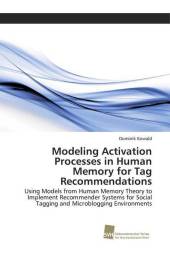 Neuerscheinungen 2017Stand: 2020-02-01 |
Schnellsuche
ISBN/Stichwort/Autor
|
Herderstraße 10
10625 Berlin
Tel.: 030 315 714 16
Fax 030 315 714 14
info@buchspektrum.de |

Dominik Kowald
Modeling Activation Processes in Human Memory for Tag Recommendations
Using Models from Human Memory Theory to Implement Recommender Systems for Social Tagging and Microblogging Environments
2017. 168 S. 220 mm
Verlag/Jahr: SÜDWESTDEUTSCHER VERLAG FÜR HOCHSCHULSCHRIFTEN 2017
ISBN: 6-202-32072-9 (6202320729)
Neue ISBN: 978-6-202-32072-6 (9786202320726)
Preis und Lieferzeit: Bitte klicken
Social tagging systems enable users to collaboratively assign freely chosen keywords (i.e., tags) to resources (e.g., Web links). In order to support users in finding descriptive tags, tag recommendation algorithms have been proposed. One issue of current state-of-the-art tag recommendation algorithms is that they are often designed in a purely data-driven way and thus, lack a thorough understanding of the cognitive processes that play a role when people assign tags to resources. A prominent example is the activation equation of the cognitive architecture ACT-R, which formalizes activation processes in human memory to determine if a specific memory unit (e.g., a word or tag) will be needed in a specific context. It is the aim of this thesis to investigate if a cognitive-inspired approach, which models activation processes in human memory, can improve tag recommendations. The findings of this thesis demonstrate that activation processes in human memory can be utilized to improve not only social tag recommendations but also hashtag recommendations. This opens up a number of possible research strands for future work, such as the design of cognitive-inspired recommender systems.
Kowald, Dominik
Dr. Dominik Kowald is a senior researcher in the Social Computing division at the Know-Center, Austria´s leading research center for data-driven business and big data analytics, where he works on novel algorithms for recommender systems. He has a PhD. (with hons), MSc. (with hons) and BSc. in Computer Science from Graz University of Technology.


